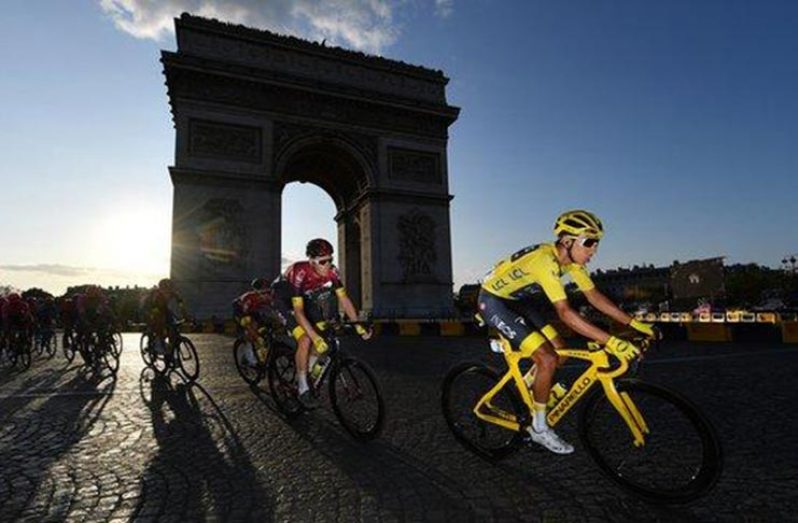(BBC) – The postponed 2020 Tour de France will now start on August 29, following the French government’s extension of a ban on mass gatherings to mid-July because of the coronavirus pandemic.
Cycling’s biggest event won by Team Ineos’ Egan Berna, last year, was originally scheduled to run from June 27 to July 19.
“Holding this event in the best conditions possible is judged essential given its central place in cycling’s economy,” said the UCI, the sport’s governing body.
Many large-scale sporting events scheduled to take place this summer have either been called off, such as Wimbledon, or pushed back by a year, such as football’s European Championship and the summer Olympics.
Four-time winner Chris Froome is set to return at this year’s Tour, which is set to start in Nice, after he missed the 2019 race, following a high-speed accident in which he broke his neck, femur, elbow, hip and ribs.
He tweeted: “The news many of us have been waiting for. Some light at the end of the tunnel.”
Geraint Thomas, the Briton who won the Tour de France in 2018, told BBC Radio 5 Live: “Hopefully those dates can go ahead. I’m super excited about that.
“The Tour is the pinnacle of the sport. If you ask anyone in the UK for three words to do with cycling, they would be: Tour de France. It would be great for the riders and the teams if it can go ahead. This is why teams exist and that’s why sponsorship comes into the sport.”
He added: “The calendar needs to be ironed out. Once we know that we can get back racing again then talks can get under way between everyone. The Tour has to take priority. That’s the main event in cycling and then hopefully we can fit other races in around it.”
Cycling’s two other three-week Grand Tour races have also been rescheduled for later this year, as part of a plan by the UCI to stage all major cycling races this season.
The Giro d’Italia – which was scheduled to take place in May – and the Vuelta a Espana, originally set for September, will now be raced after September’s World Championships.
The championships, which will be held in Switzerland, remain in their September 20-27 slot, which means the Tour de France will finish on the same day the week-long championships begin.
That means the men’s World Championship road race will take place one week after the final day of the Tour.
The postponed ‘monument’ one-day races – Milan-San Remo, Liege-Bastonge-Liege, Tour of Flanders and Paris-Roubaix – “will all take place this season, at dates still to be defined”, added the statement.
The UCI cautioned that the calendar will remain dependent on the “world health situation”, with the body’s president David Lappartient saying “we still have work to do to finalise the establishment of an entirely revised calendar”.
On April 10, the UCI furloughed staff and cut the salaries of senior employees as a result of the coronavirus pandemic.
The women’s version of the Tour, La Course by le Tour de France, was initially scheduled to take place over one day on July 19 on the Champs Elysees in Paris.
But Tour organiser ASO said it will also be postponed and instead take place “during the Tour de France 2020”.
ANALYSIS – MATT WARWICK, BBC SPORT
As determined as the UCI is, it is hard to see how cycling’s governing body is going to fit all these races into this season.
It appears officials believe the financial implications for cancelling races in 2020 could be so detrimental – to teams and organisers – that they will instead try to push all major events back as far as they can.
But what is realistic in such an unpredictable situation as the coronavirus crisis evolves? Cycling could yet benefit commercially from being one of the few major sports not to call off much of its 2020 schedule until next year. However, if those events – having been moved – are then cancelled at a later date, there must be further financial implications.
And there is already much to sort out on the calendar, so when does the UCI think it can fit in a further six weeks of Grand Tour competition and five ‘monument’ one-day races around October and November, when most of Europe gets seriously cold and wet?




.png)









